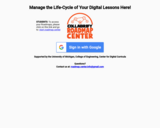
This is a KG Social Studies lesson created using MAISA/MC3 and Michigan Open Book.
- Subject:
- History
- Social Science
- Material Type:
- Assessment
- Homework/Assignment
- Interactive
- Lesson Plan
- Author:
- UMCDC
- Date Added:
- 06/19/2021

This is a KG Social Studies lesson created using MAISA/MC3 and Michigan Open Book.
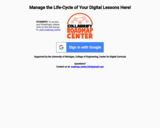
UMCDC Kindergarten MiOpenBook Chapter 4 How have we changed over time? (20-21)
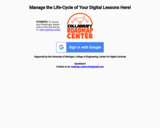
UMCDC Kindergarten MiOpenBook Chapter 4 Section 2 "How can I learn about the past?" (20-21)
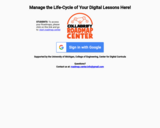
UMCDC Kindergarten MiOpenBook Chapter 4 Section 3 How do the past events in my life affect my current life? (20-21)
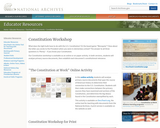
This is a self-service online workshop for teachers who use primary documents to help students see the impact and ongoing relevance of the Constitution. It requires little advance preparation and provides everything needed, including a vocabulary list, document analysis worksheets, and historical documents -- John Marshall's Supreme Court nomination (1801), proclamation to New Orleans (1803), Lincoln's telegram to Grant (1864), Johnson oath photo (1963), and more.
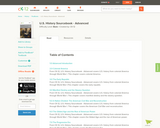
From CK-12, U.S. History Sourcebook - Advanced covers U.S. history from Colonial America through World War I. This book provides high school U.S. History teachers and students with sets of primary and secondary sources about important topics. Some teachers will use it as a supplement to a traditional textbook. For those looking to leave the textbook behind entirely, it will provide a course with basic structure and continuity, and will reduce the burden of finding new primary sources for each class meeting. However, it is not yet comprehensive enough to meet the coverage requirements of, for example, an Advanced Placement test.
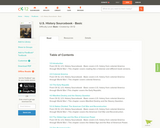
From CK-12, U.S. History Sourcebook - Basic covers U.S. history from Colonial America through World War I. This book provides high school U.S. History teachers and students with sets of primary and secondary sources about important topics. Some teachers will use it as a supplement to a traditional textbook. For those looking to leave the textbook behind entirely, it will provide a course with basic structure and continuity, and will reduce the burden of finding new primary sources for each class meeting. However, it is not yet comprehensive enough to meet the coverage requirements of, for example, an Advanced Placement test.

French Vocabulary Audio Clip Crown
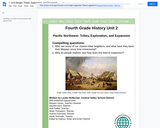
The unit has two parts. In each, students dive into inquiry to answer the compelling questions:
1. Who are some of our closest tribal neighbors, and what have they been their lifeways since time immemorial?
2. Why do people explore, and how does this lead to expansion?
Part 1 is focused on the examination of the northwest and some of the original inhabitants. Through these questions students will learn about the culture of some of their closest tribal neighbors, the Spokane Indians. The final project for Part 1 is a cultural investigation display, in which students will show what they know about the culture of the Spokane Tribe.
In Part 2, Students will also learn about forces that brought change to the northwest: fur trade era and exploration. Students will ultimately learn about the Corps of Discovery and the Oregon Trail and know the impact each had on the west. Students will finish Part 2 with a timeline activity that will reflect choice and build upon student strengths according to their skill set.
Finally, a lesson on a Tribe of the Columbia Plateau is offered as an extension, but it is strongly recommended that students get to experience this lesson.
Note that the emphasis here is on the Spokane Tribe as one of our closest tribal neighbors. In no way is this an exhaustive study nor should the tribal cultures be generalized to other tribes of the region. We understand that each tribe in our region and North America was and continues to be unique in its culture, practices, lifeways, and traditions.

In 1870, the United States was primarily an agricultural nation. Most Americans made a living from farming. Flash forward fifty years and the United States underwent a major transformation as more Americans left farming in search of industrial jobs in cities.With the discovery and usage of raw materials, creation of new inventions, and expansion of big business; the Industrial Revolution transformed the American economy and the lives of millions of Americans.

During the end of the 1800s, society had changed dramatically as a result of the Industrial Revolution. Cities had grown and the demographics of the American population had become increasingly diverse. Although the economic gains were substantial, this came at a significant social cost. The nation began to struggle with issues of unemployment, dangerous working conditions, and political corruption. Although private citizens had long been making attempts to reform these issues, many began to feel that an increased role of government would be necessary to effectively address the nation’s problems.
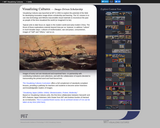
Visualizing Cultures was launched at MIT in 2002 to explore the potential of the Web for developing innovative image-driven scholarship and learning. The VC mission is to use new technology and hitherto inaccessible visual materials to reconstruct the past as people of the time visualized the world (or imagined it to be).
Topical units to date focus on Japan in the modern world and early-modern China. The thrust of these explorations extends beyond Asia per se, however, to address "culture" in much broader ways—cultures of modernization, war and peace, consumerism, images of "Self" and "Others," and so on.
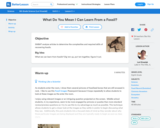
Objective
SWBAT analyze articles to determine the complexities and required skills of recovering fossils.
Big Idea
What we can learn from fossils? Dig 'em up, put 'em together, figure it out.
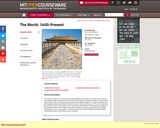
This course surveys the increasing interaction between communities, as the barrier of distance succumbed to both curiosity and new transport technologies. It explores Western Europe and the United States' rise to world dominance, as well as the great divergence in material, political, and technological development between Western Europe and East Asia post–1750, and its impact on the rest of the world. It examines a series of evolving relationships, including human beings and their physical environment; religious and political systems; and sub-groups within communities, sorted by race, class, and gender. It introduces historical and other interpretive methodologies using both primary and secondary source materials.
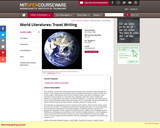
"This semester, we will read writing about travel and place from Columbus's Diario through the present. Travel writing has some special features that will shape both the content and the work for this subject: reflecting the point of view, narrative choices, and style of individuals, it also responds to the pressures of a real world only marginally under their control. Whether the traveler is a curious tourist, the leader of a national expedition, or a starving, half-naked survivor, the encounter with place shapes what travel writing can be. Accordingly, we will pay attention not only to narrative texts but to maps, objects, archives, and facts of various kinds. Our materials are organized around three regions: North America, Africa and the Atlantic world, the Arctic and Antarctic. The historical scope of these readings will allow us to know something not only about the experiences and writing strategies of individual travelers, but about the progressive integration of these regions into global economic, political, and knowledge systems. Whether we are looking at the production of an Inuit film for global audiences, or the mapping of a route across the North American continent by water, these materials do more than simply record or narrate experiences and territories: they also participate in shaping the world and what it means to us. Authors will include Olaudah Equiano, Caryl Philips, Claude L?vi-Strauss, Joseph Conrad, Jamaica Kincaid, William Least Heat Moon, Louise Erdrich, ?lvar N